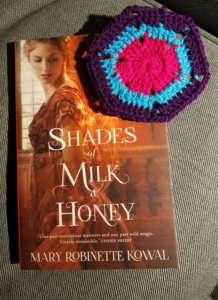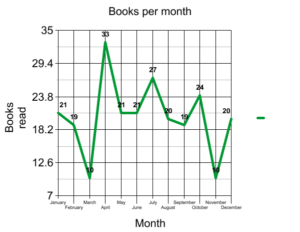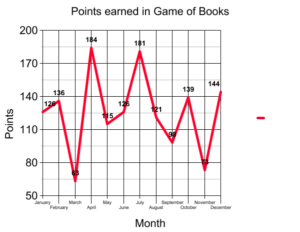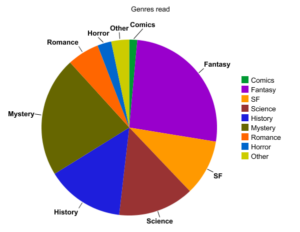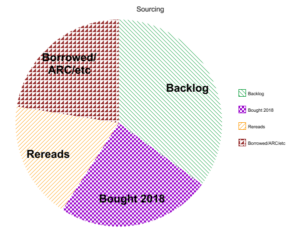It’s been a Week, and I’m behind on all kinds of blog things. So I thought I’d quickly share a pic of one of my recent hexagons, and the exact pattern if you wanted to follow me exactly.
So first, here’s the hexagon for Shades of Milk and Honey, a reread (the deep purple outer ring, “emperor”) that’s fantasy, romance and historical fiction (“turquoise” for fantasy, “bright pink” for romance; it’ll be “spring green” for other when I read any historical fiction, but I wanted to keep it somewhat simple).
The pattern is from CrochetSpot, but they don’t explain exactly how to do it (it’s more how to work out the pattern for an expanding motif of any number of sides) and I’ve made a few tweaks for stability. This might sound like total witchcraft if you’re not into crochet!
So if you’re looking at the pic above, we’ll call the pink colour A, the blue colour B, and the purple colour C. We’re using US terminology, because that’s what I’m most used to in patterns.
Dc – double crochet
Ss – slip stitch
Ch – chain
Chain space – the visible gap between the clusters in the previous round
Round 1: With colour A, do 3ch up from a magic circle and then 17 dc into the magic circle. Draw it closed so there’s almost no hole. Ss into the top of the 3ch. (18 stitches)
Round 2: 3ch (counts as first dc). *[dc, ch3, dc] in next stitch, dc in next two stitches*, repeat from * around until you have six clusters of four stitches each. Ss into the top of the 3ch. (24 stitches)
Round 3: Join with colour B in the first stitch of a cluster. 3ch, 3dc, *[dc, ch3, dc] in ch space, dc in next 4 stitches*, repeat from * around until you have six clusters of six stitches each. Ss into the top of the 3ch. (36 stitches)
Round 4: Join with colour C in the first stitch of a cluster. 3ch, 5dc, *[dc, ch3, dc] in ch space, dc in next 6 stitches*, repeat from * around until you have six clusters of eight stitches each. Ss into the top of the 3ch and tie off. (48 stitches)
I’ve made slight adjustments from the CrochetSpot pattern, as I mentioned, mostly for stability; I don’t like having the 3ch forming chain spaces, as then you can get stretchy gappiness when joining to the rest of the cluster instead of a smooth consistent look all round. I’ve found that making sure the 3ch is part of the cluster keeps things neat. You can improve that by starting right in the center of a cluster when you change colours.
If you’re doing that, you can just think of it as 3ch from where you are, crochet into each dc from the previous round, and [dc, 3ch, dc] in the chain spaces. It’s true in every round after the second, if you want to make the hexagon bigger. Mine comes out just a bit bigger than the palm of my hand; around 10cm in diameter. If you’re looking for an easy motif that isn’t a plain old granny square, this is pretty simple and repetitive. I’m now down to about 30 minutes for making a motif, joining it to the other squares, and tucking in the ends.
